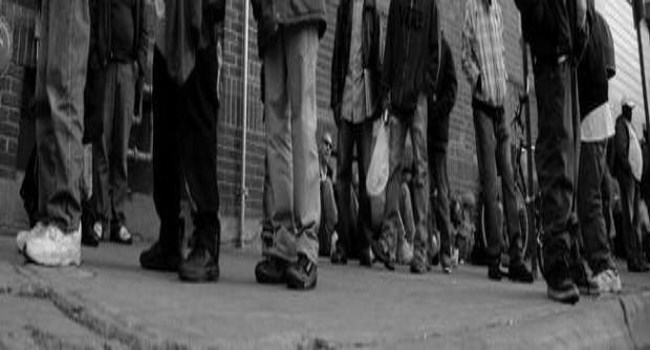It’s 6:30 AM. I’m serving porridge and handing out some donated brown-spotted bananas and some apples that are due.
It’s quiet, the holiday season frenzy is past. But the line is lengthening and now I’m busy. “Patience,” someone says, “he’s the only one in the kitchen.” Most are patient. Most are polite. Most respond to a greeting. Many initiate a greeting.
Then there are two men, one young, one older, then an argument about nothing, maybe queue-jumping. The older one drives his head into the nose and mouth of the younger one, I hear a cracking noise, there’s blood, now fists, a cup smashed on the floor, the older one is bigger, meaner, picks up a chair, others step in and move to separate the two, staff appear, the young man leaves quickly, the older one, raging, roars after him, kicks at the heavy glass door, flings it open and marches through. Staff clean up the mess, people go back to their tables, back to their porridge, it’s quiet again. Nothing has happened. Everything has happened.
A man with five or six teeth is thanking me for being here, for volunteering. He repeats himself. He’s far too effusive. A woman with blister-thickened hands is stirring mountains of sugar and powdered cream into her coffee. A young man wrapped in a sleeping bag, wreathed by odour and grime, takes his oatmeal. I would like him to move by quicker.
The next person takes his porridge with great belligerence, cursing me and the cereal in equal measure. I ask if anything is wrong. He spits, “What the fuck do you think? I’m here!” I do not say I understand, I say only that I’m sorry. He vows never to be back. I’ve served him before, I’ll likely see him here again. I recall a quote attributed to St. Vincent de Paul: “You must love the poor very much so that they will forgive you for helping them.” Would that I could rise to that. I fail. I only try not to further wound another’s dignity.
A girl with sores on her face, her limbs spastic, moves jerkily back to her table carrying a full bowl. There is something heroic in the way she manages to spill very little of her milk, something heroic in her ability to move in these mortal shadows, to sit in her own darkness and a darkness not of her own making, and still herself, steady her spoon, and eat, and be, at least for a moment, at peace.
Zechariah’s prayer-poem:
By the tender mercy of our God,
the dawn from on high will break upon us,
to give light to those who sit in darkness and in the shadow of death,
to guide our feet into the way of peace.
Wouldn’t that be something.


Poetically powerful, powerfully poetic
Thank you so much adela!
Stephen – thanks for this piece. I first read some of your work many years ago in the Edmonton Journal (See You in the Morning – God’s greeting at Easter arrests our fear of death). Since then I have read your e-mail offerings and appreciated almost all of them. Thank you.
Today you have captured the atmosphere of a drop in centre very well; you have a way with words.
Herman
Thank you for reading and responding Herman. It means a lot.
Penetrating description and imagery of ‘the shadow of death’; kudos to
an agent of ‘tender mercy’
Thank you for your kindness Ike.
Thanks Steve for giving once again a perspective that makes my shadows extremely light. Peace to you..
Thank you so much Len. And peace to you.
Thanks for volunteering and writing about it so honestly. May we all find a way to the foot-wash basin of those less fortunate than us.
Thank you Emily. Beautifully said.
Beautiful Steve. The Words drew me in like nothing I have felt in a while. Miss you guys.
Thank you so much Denis. That means a lot, especially from someone who knows the environment.
This is lovely…
Thank you Anne.
Would that it were so.
Myrna